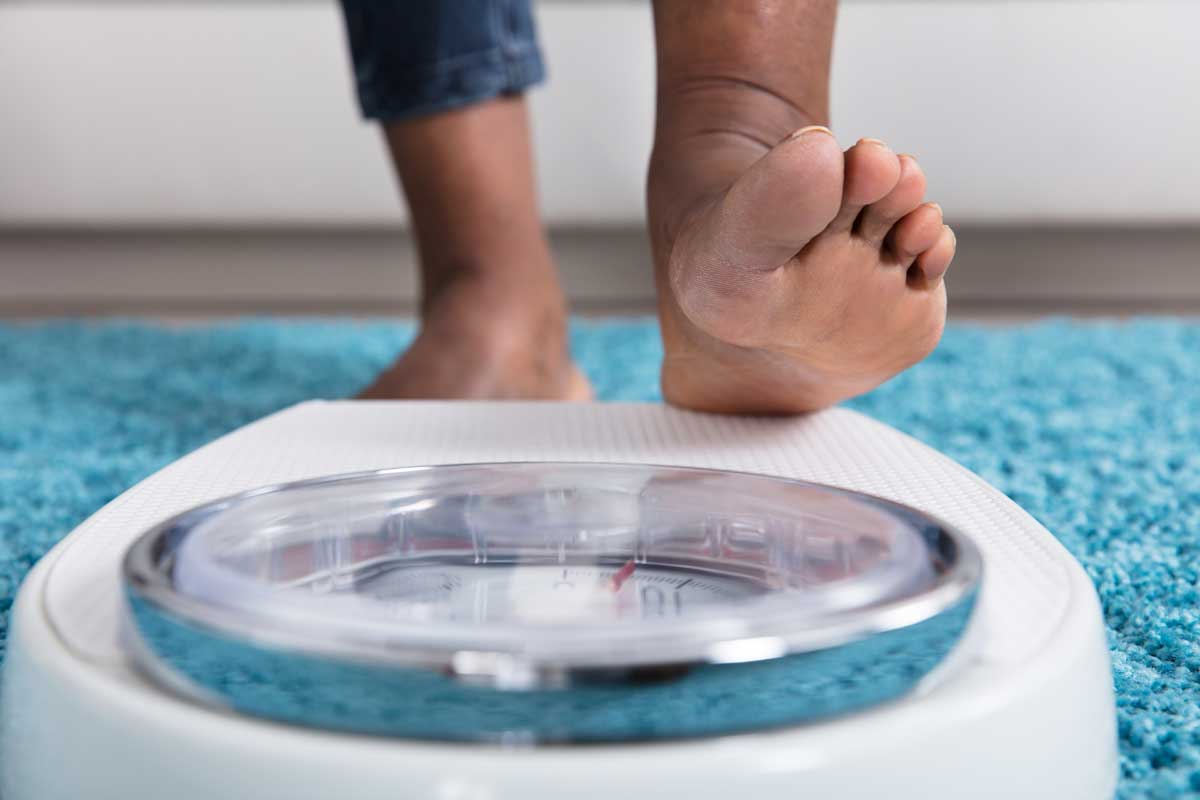A couple of years ago, a new patient came to my office. She was in her early 40s and was struggling with her weight. She had three young kids and had had gestational diabetes in all her pregnancies. After her first two pregnancies, she had gradually lost all the weight she had gained in pregnancy, but after pregnancy number three, she was stuck.
All the ways she had lost weight in the past were not working for her now. And at her recent physical, she had been diagnosed with prediabetes. This worried her much more than the number on the scale.
The last straw was when she and her husband did Whole30 together. She even skipped having a glass of wine or dessert on her birthday to follow the diet, and still neither her blood sugar nor the scale would budge. We discussed her goals and options and decided she would benefit from the weight-loss medicine Wegovy. Over the next 14 months, she lost about 13% of her body weight and her blood sugar came down to normal levels.
You can’t read the homepage of a news site without encountering Ozempic, Wegovy, Mounjaro, or Zepbound. They are either being touted as miracles or vilified as dangerous. Unsurprisingly, they are neither villainous nor miraculous. Emily reviewed the data on Ozempic a while back, but today I am going to share my approach to using these medications based on more than a decade of experience working with patients like the one above.
Are these medicines all the same?
Let’s start by clearing up some common confusion regarding names. Today we are talking about two medications, semaglutide and tirzepatide. Semaglutide is manufactured by Novo Nordisk and sold under the brand names Ozempic — for Type 2 diabetes — and Wegovy — for weight loss. Ozempic and Wegovy are the exact same drug made in the same factories by the same company. Tirzepatide is manufactured by Eli Lilly and sold under the brand names Mounjaro — for Type 2 diabetes — and Zepbound — for weight loss. Mounjaro and Zepbound are the exact same drug made in the same factories by the same company.
Why so many names? The U.S. Food and Drug Administration (FDA) requires that a medication approved for different indications — here, Type 2 diabetes and obesity — be marketed under different brand names.
Semaglutide belongs to a class of medications called GLP-1 agonists. This class of medications is not new. The first GLP-1 agonist was approved by the FDA in 2005. The idea of using these medications for weight loss is also not new. Doctors started using GLP-1 agonists off-label — doctors can prescribe any medication approved by the FDA for any indication, not just the indication it is approved for — for weight loss pretty much from the moment they were approved. The first GLP-1 agonist was approved for weight loss in 2014.
Tirzepatide is similar to semaglutide in that it is a GLP-1 agonist, but it is also a GIP agonist. Without getting into too much biochemistry, it blocks two receptors instead of one. This extra activity seems to make tirzepatide more effective than medications that are only GLP-1 agonists.
There are several reasons you can’t avoid reading about these medications and you have never heard of their predecessors. The older GLP-1 agonists required very frequent injections — once or twice daily — and did not work as well for weight loss. The ease of use and effectiveness of these new medications has made them popular, and celebrity endorsements (think Oprah and Kim Kardashian) have made them household names.
When do I consider using Wegovy or Zepbound?
I take an evidence-based approach to weight loss and make the decision to use Wegovy or Zepbound together with my patients. We look holistically at the patient’s metabolic health, including blood pressure, cholesterol, liver function tests, and blood sugar. The goal of weight loss is not to target a particular BMI, but rather to improve patients’ overall metabolic health.
Lifestyle change is key, but, as with my patient above, sometimes diet and exercise don’t yield results. When lifestyle changes feel futile, it makes sense that people give up on them. Medications like Wegovy and Zepbound are tools that help patients see results for their efforts. They are not a replacement for healthy habits; many of my patients are already eating a balanced diet and exercising regularly.
Wegovy and Zepbound are also not a quick fix to get into a dress for an event. My goal is for patients to lose one to two pounds per week, and I tell my patients to expect to be on the medication for at least a year.
What about side effects?
Most of my patients experience nausea and often constipation, especially when starting the medications. Usually these side effects subside with time. I have read horrifying reports of people tolerating intractable vomiting while taking these medications. In my experience, this is the result of increasing the dose too aggressively.
The clinical trial of Wegovy for weight loss used an aggressive monthly dose escalation. If you consider the goal of a clinical trial — to gather enough data to show that a drug is safe and effective as quickly as possible — this makes sense. Study participants lost nearly 15% of their body weight in just over a year. Patients who could not tolerate the prescribed dose escalation were required to leave the trial.
Outside of clinical trials, there is no reason to rush. I take a more measured approach to dose increases and only increase from one dose to the next if my patients are not losing one to two pounds per week on their current dose. In my clinical experience, patients who have a lot of side effects with Wegovy or Zepbound achieve just as much weight loss by continuing on lower doses of the medication.
It is not unusual for doctors to adapt how they prescribe medications from methods used in clinical trials. We get feedback from our patients regarding how a medication impacted them. Patterns start to emerge as we gain experience with a medication, and we can better balance benefits and side effects by adjusting how we prescribe them.
A whole host of other possible side effects of these medications have been discussed in the media, including hair loss, “Ozempic face,” and stomach paralysis — this is not a medical term; doctors refer to it as delayed gastric emptying, and it is not a side effect but the desired effect of the medication. Many of the symptoms patients experience are the result of significant weight loss, not of the medications themselves.
Two other impacts of these medications do deserve a note. First is the risk of medullary thyroid cancer (MTC). MTC is a very rare type of thyroid cancer, typically only seen in patients with a strong family history of MTC. If no one in your family has MTC, this should not worry you.
The other is lean muscle loss. While studies suggest that the weight lost with these medications is primarily fat, there is data to suggest that some patients may lose lean muscle mass as well. This is not surprising to me. If you lose weight, it requires less work to perform regular daily activities. If your body is doing less work, you will lose muscle. I recommend that my patients continue weight-bearing exercise throughout their treatment, and we monitor their body composition at office visits using bioimpedance.
How much weight can patients expect to lose?
How much someone will lose with Wegovy or Zepbound really depends on where they are starting. I have had a few patients lose more than 100 pounds over several years. But most patients don’t have 100 pounds to lose. I always ask patients to remember a weight at which they felt good and make a note of that weight. It may not be a realistic goal, but it gives me a sense of their expectations.
My initial goal for every patient is to lose about 10% of their starting body weight. Why 10%? Because that is the amount of weight loss that has been shown to improve metabolic disease like high blood pressure and blood sugar.
Once the patient has reached that goal, we reassess. How do they feel? What do their lab tests look like? What kind of lifestyle changes have they made, and are those changes sustainable? My patients and I decide together when they have achieved their weight-loss goals.
Are there benefits beyond weight loss?
Clinical trials show that Wegovy and Zepbound are effective for weight loss and for improving blood sugar metabolism. We know that GLP-1 agonists decrease the risk of heart disease in patients with Type 2 diabetes, but it was not clear if that was a direct effect of the medication or an expected benefit of better blood sugar management.
In 2023 the results of the SELECT trial were published. In this trial of more than 17,000 patients with overweight or obesity and a history of cardiovascular disease, but no diabetes, semaglutide was shown to reduce the risk of new cardiovascular events.
The group taking semaglutide lost about 9% of their body weight. The placebo group lost less than 1% of their body weight. Weight loss in the range seen in the semaglutide group improves metabolic function, so it may be the weight loss that results in reduced cardiovascular risk, not the medication itself. That said, it does seem that people who lose weight with these medications get the same benefits of weight loss as people who have lost weight without medication.
Do people need to take Wegovy and Zepbound forever?
I have many patients who prefer to continue on Wegovy or Zepbound to help them maintain their weight loss. They worry they will regain the weight they have worked so hard to lose, but they also note that they feel full for the first time in their lives, they are less moody and irritable, and they sleep better. This is probably all related to improved blood sugar metabolism.
The most common reason my patients stop Wegovy and Zepbound is because they would like to try to get pregnant. As of this writing, we do recommend stopping both medications prior to becoming pregnant because we don’t have any data about how safe they are in pregnancy.
Occasionally patients lose so much weight with Wegovy or Zepbound that we need to stop the medication to be sure patients don’t lose too much weight. I also have patients who choose to come off the medications because they have reached their goal and want to maintain their weight loss on their own.
There is no data to help us know how to take patients off Wegovy or Zepbound. All we really know is that stopping high doses of either medication abruptly does result in regain. My patients who choose to come off Wegovy and Zepbound have good success with a very gentle tapering of the dose, typically over months. I do have patients who have maintained their weight loss for several years after stopping medication.
A final word: Medicines like Wegovy and Zepbound are not for everyone. They are not intended for patients looking to lose a small amount of weight. For patients who struggle with overweight and obesity, and have metabolic diseases like high blood pressure, high cholesterol, and high blood sugar, these medications are an important tool, where previously we had very few effective treatments to offer.
The bottom line
- There are a lot of brand names being used, but usually we are talking about only two medications: semaglutide and tirzepatide.
- It is not necessary to “normalize” BMI to see significant improvements in blood pressure, cholesterol, and blood sugar from weight loss.
- The side effects of Wegovy and Zepbound — including nausea, constipation, and loss of lean muscle mass — can often be lessened with medication dose adjustments and lifestyle changes.
- Some people are able to stop semaglutide or tirzepatide when they reach their goal weight. Others prefer to continue them to help with weight maintenance.















Log in
If I wanted to explore taking these medications for obesity where would I start? Which type of doctor prescribes and monitors these meds?
Your primary care provider would be an appropriate place to start.
Do you have any data or experience with phentermine and topomax? I took it for 4 months and lost weight that was hard to come off after second baby. I had no side effects then, and feel much better now and have not gained weight, but also feel overeating and cravings coming back sometimes. My GP said topomax was ok for maintenance, but my psychiatrist mentioned that it can increase brain fog – which with two toddlers I have enough of already! GP also said I could do phentermine again in a couple of years if weight maintenance becomes harder due to perimenopause.
Also just want to say I love this addition to parent data! I really feel like I am jumping straight from postpartum to late reproductive stage/early premenopause stage. So helpful.
Do these drugs help people with the high indicators you list (BP, cholesterol, blood sugars, etc.) but who do not need to lose weight? I have high BP and cholesterol (my blood sugar tests OK but I have experiential low-blood-sugar issues day-to-day). I’m not considered diabetic, and I weigh 128 pounds at 5’6″. I work out daily, quite hard, and also ski, hike and bike daily just for fun. I cannot get my metabolic stuff into normal ranges.
I’ve been taking Wegovy/Zepbound for about 9 months and lost 20% of my bodyweight. My story is similar to the patient’s you describe above, after having my son I had 80 lbs to lose to get back to my pre-kids weight. I was able to lose 30 on my own with diet and exercise, but the last 50 was a series of lose/gain back over 4 years. I am now almost back to my pre-kids weight and feel great. I feel like these drugs are facing the same ridicule as Prozac and other antidepressants faced when they first came out. It took years for being on antidepressants to lose the stigma, and I hope it doesn’t take a similar amount of time for GLP-1s to lose the stigma. So many people equate GLP-1s to Hollywood starlets trying to stay a size 2, when most of us on these medicines are trying to stay healthy for our families. Thank you for continuing to fight against the stigma and bring forth the important health benefits these medicines have.
I felt so weird about trying a weight loss drug. I only talked about it with a couple of people in my life. I too appreciate the data and destigmatization.